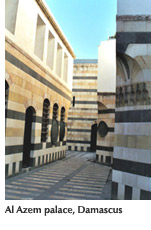August
27, 2003
 After launching an ambitious effort last year to expand
its academic resources devoted to Islamic studies, SFSU begins this academic
year with four new faculty and a cluster of courses dedicated to Islamic
civilization. After launching an ambitious effort last year to expand
its academic resources devoted to Islamic studies, SFSU begins this academic
year with four new faculty and a cluster of courses dedicated to Islamic
civilization.
"Islamic
studies is an area where we wanted to break new ground and we wanted
to do it quickly," said Joel Kassiola, dean of the
College of Behavioral and Social Sciences and one of the program’s
chief architects. "We are seeing that student interest in this area
is still growing and we expect it to continue growing."
The goal
of the new push -- first suggested by President Robert Corrigan --
is to create a one-of-a-kind interdisciplinary program in Islamic
studies with emphasis on Islamic culture, politics, architecture, literature,
philosophy and other areas that weave through many departments on campus,
Kassiola said.
The University hired its first two scholars in Islamic studies before
9/11, but the terrorist attacks accelerated student interest in classes
each following semester. For example, a class on Islamic history last
fall was so crowded with its 40 students that the second part of the
course last spring had to be moved to a larger classroom to accommodate
the more than 50 students who signed up.
The media's new
focus on Islamic culture has prompted many students to seek a deeper
understanding of it, said Carel Bertram, an assistant
professor of humanities and one of the first scholars on Islamic studies
hired by SFSU. "Students want to know more about Islamic culture
and its influence than just what they see on television or read in the
newspapers," she said.
Bertram was instrumental
in the creation of the new General Education Segment III cluster on
Islamic civilization. The aim, Bertram said, is
to bring together challenging courses that will help students gain insight
into the diversity of Islamic culture. "Islamic culture is not only
complex in literature, art and philosophical ideas, but it has been shaped
and shared by a rich mosaic of different Muslim and non-Muslim communities.
All of them are worth our study," she said. "We want to introduce
students to the multifaceted role that Islamic culture has played historically
as well its role in contemporary society."
Classes
offered in the cluster are found across the curriculum. For example,
this semester the Department
of Humanities offers a class taught
by Bertram on Islamic cultural expression. Political Science lists a
new course on Middle Eastern states and Ethnic Studies offers a course
on contemporary Arab and Arab American literature.
And students
can choose from other related courses -- although not yet officially
part of the cluster -- such as a class on Islamic mysticism
in Philosophy and classes on Arab American identity and Arab media images
in America, both offered by Ethnic Studies.
Many of
those courses will be taught by the new incoming scholars in Islamic
culture who join Bertram, an expert on Islamic architecture and
Maziar Behrooz, an authority on Islamic history. New faculty with backgrounds
in Islamic studies -- the result of lengthy searches -- include Nicole
Watts, an assistant professor of political science, who studies Kurdish
politics and social movements; Mohammad Azadpur, an assistant professor
of philosophy, who has expertise in Islamic thought; and Lucia Volk,
assistant professor of anthropology, who researches the people and culture
of the Middle East. Joining the faculty in the spring will be Burcu Akan
Ellis, an assistant professor of international relations, who studies
Muslim states and communities. And the College
of Ethnic Studies will
soon launch a national search for a specialist on Islamic American communities.
-- Ted
DeAdwyler
 |
